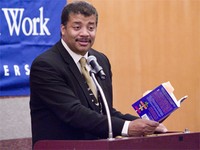Nov 18, 2005 By: yunews
 Nov 18, 2005 -- Neil deGrasse Tyson, the Frederick P. Rose Director of the Hayden Planetarium in New York City and Yeshiva College’s Writer-in-Residence for the fall semester, spent the evening of Nov. 14 “communicating science” to Yeshiva University students and faculty.
During the lecture, titled “Explorations in Science Writing: A Personal Journey,” Dr. Tyson read from his first book “Merlin’s Tour of the Universe” which is a compilation of columns he wrote in a science journal. To explain difficult concepts in science, Dr. Tyson used a character named Merlin, who has existed since the beginning of time and is able to visit with historical figures of any time period. He got his start as a writer when he penned the Merlin columns for $50 each.
“The challenge was making it interesting,” explained Dr. Tyson, who left the audience laughing with his quirky answers and self-deprecating humor on a wide range of topics, including how he got his start in writing and his pet peeve: inaccuracies about astronomy in popular culture.
As the YC Writer-in-Residence, Dr. Tyson teaches a weekly course in writing to 12 members of the Jay and Jeanie Schottenstein Honors Program at Yeshiva College.
Tyson, who has been described as the Carl Sagan of today, also impressed the audience with his knowledge of science. Adam Mayerhoff of Monsey, NJ, a Yeshiva College freshman in the honors program, was intrigued by Dr. Tyson’s explanation of how black holes work.
Several students asked questions about the controversy over classifying Pluto as a planet. Dr. Tyson became quite animated as he explained that at the Upper West Side planetarium where he is the director, Pluto is not listed as a planet, but rather a comet.
"I thought I was going to a dry astrophysics lecture," said Havah Oxman, a junior at Stern College for Women. "It turned out to be more like stand-up comedy with some science on the side."
One audience member asked Dr. Tyson how to get Americans to be interested in science, a topic clearly dear to the astrophysicist’s heart. He told the gathering that interesting writing was a key component, but so was encouraging people to explore the limits of what is commonly known.
“I want to create a society that asks questions,” Dr. Tyson said. “Not enough of this nation engages information that way.”
Nov 18, 2005 -- Neil deGrasse Tyson, the Frederick P. Rose Director of the Hayden Planetarium in New York City and Yeshiva College’s Writer-in-Residence for the fall semester, spent the evening of Nov. 14 “communicating science” to Yeshiva University students and faculty.
During the lecture, titled “Explorations in Science Writing: A Personal Journey,” Dr. Tyson read from his first book “Merlin’s Tour of the Universe” which is a compilation of columns he wrote in a science journal. To explain difficult concepts in science, Dr. Tyson used a character named Merlin, who has existed since the beginning of time and is able to visit with historical figures of any time period. He got his start as a writer when he penned the Merlin columns for $50 each.
“The challenge was making it interesting,” explained Dr. Tyson, who left the audience laughing with his quirky answers and self-deprecating humor on a wide range of topics, including how he got his start in writing and his pet peeve: inaccuracies about astronomy in popular culture.
As the YC Writer-in-Residence, Dr. Tyson teaches a weekly course in writing to 12 members of the Jay and Jeanie Schottenstein Honors Program at Yeshiva College.
Tyson, who has been described as the Carl Sagan of today, also impressed the audience with his knowledge of science. Adam Mayerhoff of Monsey, NJ, a Yeshiva College freshman in the honors program, was intrigued by Dr. Tyson’s explanation of how black holes work.
Several students asked questions about the controversy over classifying Pluto as a planet. Dr. Tyson became quite animated as he explained that at the Upper West Side planetarium where he is the director, Pluto is not listed as a planet, but rather a comet.
"I thought I was going to a dry astrophysics lecture," said Havah Oxman, a junior at Stern College for Women. "It turned out to be more like stand-up comedy with some science on the side."
One audience member asked Dr. Tyson how to get Americans to be interested in science, a topic clearly dear to the astrophysicist’s heart. He told the gathering that interesting writing was a key component, but so was encouraging people to explore the limits of what is commonly known.
“I want to create a society that asks questions,” Dr. Tyson said. “Not enough of this nation engages information that way.”